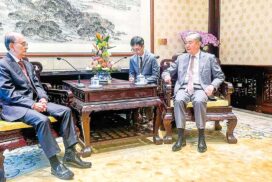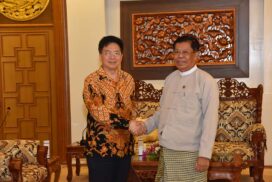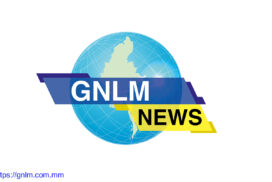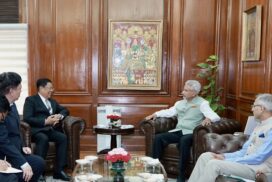The Ministry of Foreign Affairs (MoFA) is proud to celebrate the 77th Anniversary of its founding on 17 March 1947, a year before the country gained Independence on 4 January 1948.
Although the history of MoFA as an institution is only 77 years old, Myanmar’s diplomatic history can be traced back to more than 2,000 years ago, in the 2nd century BC. Over seven decades, MoFA has expanded in its strength at home and its Missions abroad. Along with this growing strength, flourishing diplomatic relations and activities, enhanced capacity and achievements of Myanmar Diplomats are also discernible.
At its founding, the “Department of Foreign Service” had a total strength of 9: one official (Secretary) and eight rankers under the leadership of Bo Gyoke Aung San. On 4 May 1948, the department was renamed as the “Foreign Office”, and the Secretary was also renamed as “Permanent Secretary”. The Ministry got its current name as the “Ministry of Foreign Affairs” (MoFA) on 25 May 1967. Nowadays, MoFA is functioning with a total strength of more than a thousand, two-thirds of which are serving at headquarters, and more than one-third are serving at 51 Myanmar missions across the world.
Over seven decades, the Ministry has been consistently pursuing “Independent, Active and Non-Aligned Foreign Policy” and making remarkable contributions to the interest of the people, the country and beyond by fulfilling its foreign policy objectives for Peace, Prosperity and the Image of the nation.
Under post-independence administrations, a historical recognition of Myanmar as a contributor to global peace was brought by the outstanding Myanmar diplomat, U Thant, who played a major role as the Secretary General of the United Nations for two consecutive terms from 1961 to 1971 in diffusing the Cuban Missile Crisis, terminating the civil war in Congo, easing tensions between major powers. The country’s image was significantly enhanced by the outstanding Myanmar Diplomat, who is well respected globally today.
Another significant joint initiative Myanmar took together with China and India in June 1954 was “the Five Principles of Peaceful Coexistence”, which has now become the basic norm for state-to-state relations. The principles include mutual respect for sovereignty and territorial integrity, mutual non-aggression, non-interference in each other’s internal affairs, equality and mutual benefit, and peaceful coexistence. These principles ensure the peaceful conduct of mutual relations and their relations with other countries in Asia and the world.
Building on this joint initiative, MoFA was able to set another significant milestone demonstrating Myanmar’s diplomatic leadership by co-organizing the Bandung Conference (also known as the Asian-African Conference) on 18-24 April 1955 together with Indonesia, Sri Lanka, India and Pakistan. The Conference brought together representatives from 29 countries, which account for more than half of the global population. The Conference laid out the Ten Principles of Bandung, which expanded the Five Principles of Peaceful Coexistence.
Myanmar played an active role in the founding of the Non-Aligned Movement (NAM) in 1961, and continuing commitment to NAM was made known by Myanmar at the Ministerial Meeting of NAM on 17-18 January 2024 in Kampala, Uganda, ensuring to work more closely with its members for greater peace, prosperity, justice, equality and development of the developing countries and globally.
Under the administration of the State Law and Order Restoration Council and State Peace and Development Council, MoFA was able to manoeuvre amidst the Western sanctions while bringing about security and economic development outcomes.
The Ministry has been able to project the image of Myanmar as an active contributor to international peace and security by signing and promoting universal adherence to the Treaty on the Prohibition of Nuclear Weapons (TPNW) and Comprehensive Nuclear-Test-Ban Treaty (CTBT) and acceding to the Convention on Nuclear Safety and the Convention on the Physical Protection of Nuclear Material in 1996. Particularly, Myanmar diplomats in Jakarta, Geneva and New York frontlines are actively promoting the agenda of disarmament, specifically nuclear disarmament adhering to and promoting the Southeast Asia Nuclear Weapon Free-Zone Treaty (SEANWFZ). Also, Myanmar has been tabling a draft resolution on Nuclear Disarmament in the First Committee with the support of the majority of UN member states since 1995.
Another remarkable step taken by MoFA was joining the Association of South East Asia Nations (ASEAN) in 1997. Since its joining ASEAN, Myanmar has been part of the success story of regional integration in many aspects of the regional community. The issues of common interests were addressed while respecting the spaces and pace with which each member was comfortable.
When the country took a democratic turn in 2011, MoFA contributed to regaining diplomatic glory by hosting the visits of statesmen from Western capitals; Prime Minister David Cameron of the United Kingdom, President Barack Obama of the United States, Secretary of State Hillary Clinton paid respective visits in 2012, 2013 and 2014.
MoFA was able to promote Conference Diplomacy, hosting the World Economic Forum for Asia in 2013, the ASEAN Summit and BIMSTEC Summits in 2014. The lifting of sanctions followed. From 2011 to 2015, the country’s Official Development Assistance (ODA) profile was tripled, and its trade value, FDI and tourist arrival increased. The very first elected government of the country since 1960 built a firm foundation for the country’s external relations.
Under succeeding administrations from 2016-2020, greater diplomatic gains were made as the United States and the European Union lifted the economic sanctions imposed on Myanmar for decades. The country was able to foster better relations with world superpower the United States, economically powerful Japan, and emerging power China.
Under the State Administration Council, MoFA took a vibrant approach by following the guidance of the Chairman of the State Administration Council to abide by Section 41, 42(a) and (b) of the State Constitution to practice independent, active and non-aligned foreign policy aiming at world peace and friendly relations with all nations and upholds the principles of peaceful coexistence among nations and fulfil its international commitments.
At this age, when every nation is exposed to more complex and challenging domestic, regional, and global circumstances, disruptive technologies, and adversarial hazards of information and social media, Myanmar is no exception. Despite the challenges the country is facing domestically and their repercussion in ASEAN and UN, MoFA has been trying its best to achieve its foreign policy goals in promoting the interests of its people and nation.
Promoting the interests of Myanmar nationals, particularly those abroad, is one of the major tasks of MoFA, and thus, it gives careful attention to this matter. Since 2020, MoFA has facilitated the safe return of 2075 Myanmar nationals from Thailand and 26,716 from China. MoFA also made necessary arrangements with local authorities of respective countries for the return of 146 Myanmar migrant workers who faced difficulties due to employer-employee issues in some Middle Eastern countries.
Similarly, MoFA facilitated the safe return of 52,823 foreign nationals (from 24 countries) who were illegally living or trapped in Myanmar territory for several reasons, including falling victim to online job scams.
The resilience of MoFA and Myanmar Diplomats is more telling in the face of the multi-dimensional challenges. Particularly, the country’s commitments to multilateralism and regional and international cooperation have also tested and proven that Myanmar abides by agreed principles even in the toughest situations when some other countries in the UN and ASEAN ignore some principles. The Ministry has been redoubling its efforts to turn this resilience into greater strength.
It is important to learn from the country’s history that the soft skills of statesmen made it possible to stand in unity, in dignity and at peace, even at a time when its physical strength was incomparable to its three neighbouring mighty Empires. MoFA and Myanmar Diplomats today will continue to strive to overcome current day’s challenges of complex nature, geopolitical situation, transnational crimes, climate change, disruptive technology, etc., through strengthened cooperation in bilateral, regional and international contexts.
Taking the opportunity of the 77th Anniversary of MoFA, this article pays tribute to the exemplary works of Myanmar diplomats under successive administrations. It also calls new generation Myanmar diplomats to take bolder steps in fulfilling the country’s Foreign Policy objectives for greater peace, progress and a stronger image of Myanmar by making use of diplomatic tools made available by the new technology, innovation, creativity and renewed vigour of seasoned diplomats as well as that of the new generation diplomats.
77th Anniversary of Ministry of Foreign Affairs commemorated
- March 17, 2024
- 146














